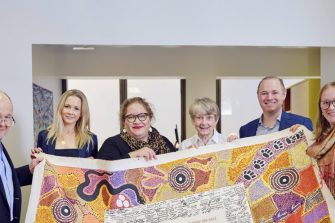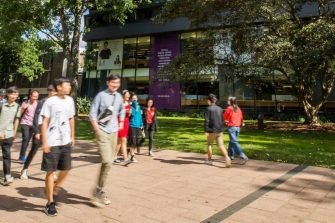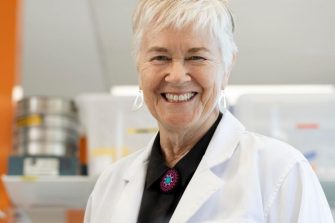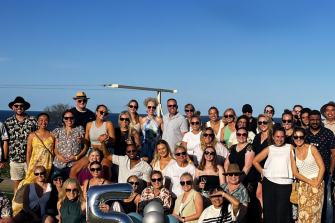
Successful commercial innovator Michael Sternberg of furniture hire company Valiant has thrown his philanthropic support behind UNSW recycling science pioneer Professor Veena Sahajwalla in her efforts to reduce manufacturing waste, and extend the lifespan of materials that would otherwise end up on the scrap heap.
Veena Sahajwalla is a Professor of Materials Science in the UNSW Faculty of Science, and the Director of the UNSW SMaRT Centre for Sustainable Materials Research and Technology. She is also a celebrated inventor, having pioneered a product known as ‘green steel’, a cleaner alternative to steel manufactured with recycled tires to replace coal-based resources.
Now, Veena has turned her attention to reducing manufacturing waste on an entirely different front, at a vastly different scale, regenerating metal alloys from e-waste. She calls it ‘microrecycling’.
“I coined that term years ago,” she laughs. “It was really about recognising that we need to look at the other end of the spectrum. For example, a big car, at the end of its life, is put through a shredder. You have one major component – steel—and you can separate that out and send it off for recycling. Then there are products like batteries. They contain a variety of elements, many of which can be regenerated and re-used. That’s when we started thinking about ‘microrecycling’.” We have been pioneering novel scientific techniques to remanufacturing materials from waste for more than a decade.
The microrecycling takes place in ‘microfactories’: small-scale facilities that, because of their size, can be set up to operate in decentralised locations and promote safe and sustainable practices. In 2021, the Microrecycling Research Hub was established with foundational funding from the Australian Research Council (ARC), and a vision to develop microrecycling science and capabilities.
Innovative supply chains based on green technologies, can bring in sustainable materials from waste as a feedstock for manufacturing. These materials are needed to create a sustainable circular economy, where reformed materials are a part of the value-chain. We need to ensure that alternative solutions to current common supply chain practices adopt new and local supply chains that incorporate resources made from our own waste.
“It's about always making products that can forever be put back into a circular economy, and recognising that the materials that are there in our products are going to continue be useful, even if the product itself is no longer functioning,” explains Veena. “So, for example, if a battery stops working, it doesn’t mean the materials are no longer useful. They can be revived and put to work in a different form. ”
The same notion, accompanied by the same sense of purpose, has driven the recent work of another innovator: UNSW alumnus and CEO of furniture hire company, Valiant, Michael Sternberg.
In 2020, under Michael’s leadership, Valiant became the first hire company to transition to an entirely paperless inventory system. Two years later, it had become Australia’s first 100 percent carbon-neutral furniture hire business, a title earned not with superficial updates to operations, but with a deep-seated reinvention of the company’s inventory, currently housing over 15 ranges of furniture crafted with post-consumer recycled and reformed plastics including bottle tops and yoghurt tubs. The company’s next big launch will feature new products made with the company’s own aged-out stock, including Y2K-era, Frank Gehry-designed plastic furniture cubes, as they endeavour to achieve B Corp certification, with their application submitted in October 2023.
This partnership with UNSW marks another significant step forward in Valiant's journey towards sustainability. They are embarking on innovative projects aimed at recycling furniture and repurposing materials found at large-scale events, reinforcing their commitment to environmental stewardship. Valiant's holistic approach to sustainability demonstrates their unwavering dedication to shaping a more environmentally conscious future and inspiring a new direction for the industry, especially in furniture practices. Aside from their collaboration with UNSW, Valiant engages in active partnerships with organisations such as the annual Purpose Conference. Through these collaborations, Valiant fosters discussions and motivates positive initiatives aimed at enhancing environmental and social impact. These joint endeavours reinforce Valiant’s core values, illustrating their commitment to making a positive contribution to society.It is an innovative program of work that, according to Michael, aims to counter the alarming environmental impacts of the commercial and residential furniture industry in Australia. It has been estimated the industry generates up to 30,000 tonnes of waste a year, almost all of it ending up in landfill.
“Everyone always talks about doing the right thing environmentally, but talk is cheap. I was determined to drive the company forward in a positive and sustainable manner,” says Michael. “The biggest initial challenge was showing that we were serious about reducing office waste, and getting everyone onboard to use the recycling bins. Once that was in place, the staff began to see that we were serious about working together to create an environmentally conscious and sustainable company, and our efforts have grown exponentially since then.”
After meeting with Veena, it became obvious to Michael that there was a valuable synergy between the work she is leading at UNSW and the innovations being pursued at Valiant. With Michael’s support, the team will be able to advance the scientific solutions that will build a module that will take the first steps out of the lab and pilot real world testing for battery microrecycling.
“It may sound like a cliché, but it feels good to be part of something bigger,” says Michael. “Doing something to help the environment by donating to the research being undertaken by Veena and her team, and by leading a company to be truly sustainable and carbon-neutral—that is very important to me. There is so much more for us to accomplish at Valiant and I am very hopeful that our partnership with UNSW will help us to continue making big, sustainable strides.”
Share this story




